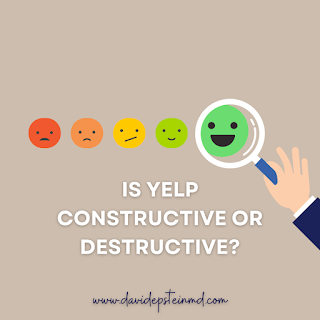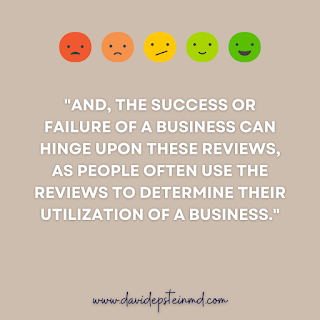I think that every business owner can empathize with the feeling of trepidation that is experienced with every Yelp review email notification. Good or bad reviews notify the business owner identically when they arrive in the email inbox. There is no differentiation between the ping notifications. You have to open the email to see the positive or negative responses.
The experience is akin to the tradition of opening college acceptance or rejection letters. You don’t know which is which until the letter is physically opened. I know that I am dating myself and college admission notifications are performed electronically now, but it was quite a ceremonial ordeal when those college admission notification letters were piled on the kitchen table and needed to be opened. Fear, anxiety, and excitement were all rolled into one as each letter was cautiously opened and read.
Nevertheless, the college admission notifications were not personal (I’d like to think). The results, either accept or reject, were based on academic performance and other scholastic or extracurricular achievements. Yelp seems to be a bit more personal. Reviews can reflect adulation and praise or loathing and disgust, depending upon what initiated the response of the client or patron. Furthermore, while a college or university is a faceless organization making a systematic decision, you know that the response on Yelp is from an individual human on the other end.
For better or worse, Yelp has empowered the customer and given them a voice to express their feelings about a business. And, the success or failure of a business can hinge upon these reviews, as people often use the reviews to determine their utilization of a business. So, it goes without saying that business owners, especially small business owners, take Yelp reviews very seriously.
While feedback about one’s business should always be a welcome opportunity for affirmation or improvement of one’s efforts, the feedback is not always constructive on Yelp. The reviews can be cruel and even inaccurate. So, while there is always room for improvement, the manner in which criticisms are relayed is important. The critiques can be constructive or traumatic. In most instances with Yelp, criticisms are mostly traumatic for business owners. Constructive feedback is usually relayed by customers in person and is usually amicable. Yelp provides anonymity to protect customer identities which can unduly empower someone to respond to a disastrous encounter with a display of nastiness and a composed, written assault instead of discussing the issue with the business owner without threatening the business owner’s livelihood.
Sure, there are always exceptional situations that warrant more extreme responses. But, for the huge volume of derogatory and vindictive comments displayed on the reviewing platform, it seems unlikely that Yelp is capturing the true picture of most businesses on its site. So, when I think of all of the business owners receiving Yelp notifications via email and having to open them, not knowing if they are good or bad reviews, I feel bad for them. The exhilaration and excitement of receiving a positive review are counterbalanced by the traumatic stress that must be generated from the anxiety and fear of having to encounter a bad review. The emotional turbulence caused by Yelp is unnecessary and causes more stress for a business owner who is already under a mountain of stress involved in creating a business in the first place.
Is Yelp constructive or destructive?



Comments
Post a Comment